World Wide Shipping Solutions For Business
Fast parcel delivery covers courier and logistics services built to move packages quickly while keeping them reliable, visible and compliant. In this guide we explain how express services, next‑day options, international customs procedures and ecommerce fulfilment work together to meet time‑sensitive needs for businesses and consumers. Common pain points — missed cut‑offs, vague transit promises and customs delays — are avoidable when you understand service types, required documents and the right technology. You’ll get a practical overview of how UK domestic express couriers operate, how same‑day and next‑day services function, which customs forms speed clearance, when air freight makes sense, and how real‑time tracking improves transparency. We also outline simple operational steps — book, prepare documents, pick the right mode and use multi‑courier platforms — so parcels arrive fast and with fewer surprises. This article reflects current market practice to help merchants and urgent shippers choose between express parcel services, air freight or a multi‑courier approach for reliable door‑to‑door logistics.
Express courier services are specialised delivery options that prioritise speed through dedicated handling, faster transport modes and service‑level commitments that define delivery windows. They speed up transit by combining priority sorting, expedited lanes and last‑mile guarantees so time‑sensitive parcels skip standard queues and reach recipients faster. The core driver is operational priority — parcels marked as express follow accelerated routing from collection to delivery and are backed by tracking and exception management to reduce failed attempts. Knowing these operational elements helps businesses choose between same‑day, next‑day, timed delivery and economy services based on urgency and cost.
The section below outlines the key features of UK domestic express couriers and how those features translate into predictable delivery outcomes.

UK domestic express couriers typically offer early collection windows, defined cut‑offs for same‑day and next‑day services, guaranteed delivery slots and optional timed windows for business recipients. Core services include door‑to‑door pickup, priority sorting at hubs, SLA‑backed last‑mile networks and customer‑facing tracking that shows estimated delivery windows. Pricing rises as guaranteed delivery times and add‑ons (signature on delivery, insurance) are added — reflecting the trade‑off between speed and per‑parcel cost. Domestic express is the right choice when parcels contain time‑sensitive goods, urgent spare parts or high‑value commerce orders that need reliable arrival; the next section explains how international express couriers deliver similar reliability across borders.
These features help create consistent outcomes for time‑critical deliveries and set clear expectations for businesses with tight SLAs.

International express couriers use hub‑and‑spoke networks, dedicated air services and established partner relationships to keep transit times short and customs handling dependable. Parcels are consolidated at regional hubs, routed on priority flights or fast road legs, and often pre‑cleared with electronic documentation to reduce border delays. Local partners handle the last mile and consolidated tracking events show movement through export, transit and import clearance. For urgent B2B samples, high‑value ecommerce shipments and time‑critical spare parts, international express is the fastest door‑to‑door option — provided paperwork is correct and duties/taxes arrangements are clear. The next section describes how next‑day parcel delivery works within the UK, useful when same‑day or next‑day transit is a priority.
These mechanisms explain why international express remains the preferred choice when both speed and customs expertise matter.
When you decide express is needed, you may want a fast commercial route to turn intent into action. For businesses and time‑sensitive shippers seeking a rapid quote or shipping consultation, Global Corporate Logistics offers multi‑courier options and expedited handling for urgent parcels. Their teams compare service levels for next‑day and timed shipments and provide business shipping consultations designed to reduce transit exceptions and improve tracking transparency. If you need a tailored quote or a shipping plan that matches volumes and service needs to the right carrier mix, a consultation helps balance cost with guaranteed transit times.
Next‑day parcel delivery in the UK follows a clear sequence: booking, collection, priority sort, dedicated transport and guaranteed last‑mile delivery within 24 hours of pickup. Providers set cut‑off times for collections that determine next‑day eligibility and run priority sorting at regional hubs to keep express consignments on fast routes. Availability can be affected by capacity limits, remote postcodes and oversized parcels, and timed or weekend services usually carry premium fees and scheduling limits. Understanding booking and cut-off workflows helps businesses plan dispatch windows and choose between same‑day and next‑day based on postcode and parcel dimensions.
A range of UK providers offer next‑day and same‑day options, each with distinct service names, coverage and cut‑off characteristics that influence suitability. Major couriers — for example DHL, DPD and Royal Mail — run next‑day services with varying cut‑offs; specialist urgent couriers and aggregators often provide same‑day or dedicated vehicle pickups in urban areas. Choosing a provider depends on parcel size, required delivery time, recipient location and whether a timed or guaranteed window is needed. For businesses with variable volume, multi‑carrier strategies can route each parcel to the carrier that offers the best mix of cost, speed and coverage.
| Service provider | Service type | Typical transit time / cut‑off / notes |
|---|---|---|
| DHL (express services) | Next‑day; timed options | Next‑day to most UK metros; earlier cut‑offs for same‑day in major cities |
| DPD | Next‑day; Predict service | Next‑day with a predictive one‑hour window; depot cut‑offs vary by area |
| Royal Mail / Parcelforce | Next‑day; economy tiers | Extensive postcode coverage; cut‑offs depend on local collection times |
| Specialist same‑day couriers | Same‑day; dedicated vehicles | City‑to‑city or regional urgent runs; typically higher cost |
This comparison makes clear there’s no single best provider for every shipment — match service type to parcel characteristics and destination postcode.
Before you book, follow these steps to maximise next‑day success:
Following these steps keeps your parcel on the priority path required for next‑day delivery. The next section looks at the trade‑offs of timed and weekend deliveries.
Timed and weekend deliveries improve customer experience by offering reliable arrival windows and flexible delivery days, but they come with higher costs and limited slot availability that add operational complexity. Benefits include fewer missed deliveries, greater customer satisfaction and the ability for merchants to charge a premium for convenience. Limits include additional scheduling complexity, reliance on courier slot capacity and surcharge fees for out‑of‑hours handling. Businesses should weigh customers’ willingness to pay for delivery certainty against the extra cost and complexity, and reserve these options for high‑value orders or customers who need them most.
Decide on timed or weekend services based on customer expectations, order value and margin impact. Next, we cover how customs and international clearance influence overall delivery speed.
International shipping speeds up customs clearance through coordinated documentation, electronic pre‑declarations and clearly assigned roles for the shipper, courier and clearing agent. A streamlined workflow relies on accurate commercial invoices, correct tariff codes and timely electronic submissions so imports clear quickly and parcels move to the final‑mile carrier. Risk‑based inspections still happen, so using experienced brokers or a courier’s customs team reduces uncertainty. The following subsection lays out the step‑by‑step customs process and highlights common choke points and timings.
Customs clearance usually follows this sequence: export declaration and departure, transit and arrival notification, import declaration with duties/VAT assessment, inspection if required, then release to the local courier for delivery. Responsibilities vary — shippers or forwarders often handle export paperwork, couriers may manage electronic pre‑clearance, and import duties can be paid by the consignee or handled under carrier brokerage terms. Processing times differ by country and documentation quality; accurate electronic submissions can cut clearance from days to hours. Identifying required documents and using pre‑clearance systems reduces the chance of customs holds and speeds overall transit.
This sequence clarifies who does what and where better documentation and communication speed clearance.
Customs clearance efficiency and its impact on trade
Efficient customs clearance can materially affect trade flows — faster processing reduces delays and costs. A. Gani, 2016
| Document / requirement | Applies to | Typical processing impact (delay risk) |
|---|---|---|
| Commercial invoice | All commercial exports | High impact if missing or inaccurate; delays import valuation and release |
| EORI number | UK/EU traders | Required for customs declarations; absence prevents clearance |
| CN22 / CN23 parcel labels | Low‑value and larger parcels | Incorrect use can trigger manual handling and holds |
| Commodity code / HS code | All dutiable goods | Misclassification leads to duty reassessment and possible inspection |
Accurate paperwork is the single most effective lever to reduce clearance delays. The next subsection summarises the key documents and duty responsibilities in practical terms.
Key documents include a complete commercial invoice, correct commodity (HS) codes, full shipper and consignee details and, where relevant, an EORI number and certificate of origin. Duties and VAT are calculated from declared value, commodity code and origin, so agree who pays (DAP, DDP or other terms) at booking to avoid surprises. Incomplete documentation or understated values often trigger manual checks and delays; using a courier’s customs brokerage or an import clearing agent reduces that risk and accelerates release. For fast international shipping, validate HS codes in advance and confirm who will pay duties to minimise clearance time.
Correct documentation plus a clear duty payment plan reduce border friction and speed door‑to‑door international delivery.
Ecommerce shipping that is both fast and cost‑efficient combines multi‑courier integration, regional fulfilment and streamlined returns to lower unit costs without sacrificing speed. Multi‑courier platforms enable automated carrier selection, rate shopping and label generation; fulfilment centres shorten transit by holding stock closer to customers; and structured returns processes cut reverse‑logistics cost and customer friction. A modern tech stack — shipping APIs, automated carrier rules and inventory‑aware fulfilment — gives merchants the agility to route parcels to the fastest or cheapest carrier per order. The next subsections explain multi‑courier integration and best practices for fulfilment and returns.
Multi‑courier integration connects multiple carriers through a single platform, enabling real‑time rate comparison, automated routing and fallback handling when a primary carrier lacks capacity. Platforms perform rate shopping based on cost, transit time and historical performance, then select the carrier that fits the merchant’s rules. This removes manual booking, lowers shipping spend via competitive routing and builds resilience against carrier disruptions. For merchants, shipping APIs and label automation speed dispatch and feed unified tracking back to customers, improving operational efficiency and delivery transparency.
| Ecommerce solution | Attribute (integration / returns / cost) | Value / benefit |
|---|---|---|
| Multi‑courier platform | Integration: API‑based routing | Lower shipping costs and broader coverage through automated carrier selection |
| Regional fulfilment centre | Integration: inventory proximity | Faster transit and lower last‑mile cost by storing stock near customers |
| Returns management service | Returns: pre‑printed labels and inspections | Faster refunds and lower reverse‑logistics cost with automated workflows |
Combined, multi‑courier platforms, regional fulfilment and returns automation help merchants control cost while keeping delivery fast.
Best practices focus on cutting lead time and handling cost through smarter inventory placement, batching and clear returns policies that guide customers and reduce unnecessary returns. Place stock near customer clusters to shorten last‑mile transit and lower rates; batch similar orders or use cut‑off windows to streamline pick‑pack‑ship operations. For returns, provide pre‑printed labels, automated authorisation and inspection workflows to speed refunds and restocking. Track return reasons and use that data to improve product descriptions or sizing and reduce return rates over time.
Adopting these fulfilment and returns practices lowers shipping costs and preserves fast, reliable delivery. For some merchants, air freight solutions are needed for larger or urgent shipments — the next section explains when to choose air freight or specialised freight services.
Choose air freight or specialised services when urgency, a high value‑to‑weight ratio or strict lead times outweigh cost concerns. These services are often paired with express parcel networks for final‑mile delivery. Air freight shortens international transit dramatically compared with sea or road, making it ideal for emergency production parts, perishables and high‑margin items where delays are costly. Road and sea remain cost‑effective for bulk, non‑urgent shipments and fit into intermodal strategies that balance cost and speed. Compare transit time, cost per kilo and handling complexity against the shipment’s commercial value to decide the right mode.
Air freight offers the fastest long‑distance transit, turning weeks into days, and is the preferred option for urgent replenishment, emergency spare parts and perishable goods that need controlled transit times. While cost per kilogram is higher than sea or road, the speed premium can be justified for small, high‑value consignments because it reduces inventory and business interruption costs. Air services benefit from frequent schedules and global networks, but shippers should account for airport handling, weight/volume pricing and any extra documentation needed to speed clearance. For the fastest door‑to‑door outcome, combine air freight to a regional hub with express last‑mile services.
Choosing air freight depends on urgency, cost tolerance and the shipment’s value density.
Road and sea freight are economical for bulk and non‑urgent consignments and can be combined with express networks in intermodal flows to balance cost and speed. For example, sea freight into a nearby port followed by expedited road or air movement to regional hubs spreads cost while keeping acceptable delivery times for customers. Road freight offers flexible regional coverage and is commonly used for consolidation or linehaul to express hubs, driving economies of scale. Intermodal planning lets shippers decide which legs need speed and which can accept longer transit to reduce cost, creating tailored solutions for mixed shipments.
Intermodal planning helps businesses optimise budget and lead time so parcels arrive quickly where it matters most.
Real‑time tracking creates scan events and location updates that reveal a parcel’s journey from pickup to delivery, enabling proactive exception handling and reducing customer enquiries. Tracking systems aggregate carrier events via APIs or aggregator platforms into a single timeline, and notification channels — SMS, email or in‑app — keep recipients informed of estimated windows, attempts and reroute options. When tracking is timely and accurate, couriers and merchants resolve exceptions faster, reduce missed deliveries and raise customer satisfaction. The subsection below explains how multi‑carrier tracking is implemented and how platforms normalise event data.
Real‑time tracking depends on carrier‑generated events — scans at collection, hubs, customs and delivery — sent via APIs, webhooks or polling to a central platform that standardises statuses and timestamps. Aggregators connect to multiple carriers and map varied carrier taxonomies into a common status model so merchants and customers see consistent updates regardless of who handled the shipment. Limitations include inconsistent scan frequency, delayed carrier updates and differing status labels, but many platforms use reconciliation rules and predictive models to estimate delivery windows and surface exceptions earlier. Understanding the event lifecycle from scan to customer notification helps you choose platforms that deliver unified tracking across your carrier mix.
Unified tracking cuts support volume and speeds issue resolution. The next subsection outlines notification options that maximise recipient readiness.
Notification services include SMS alerts, email updates, in‑app push messages and predictive delivery windows that give recipients a one‑ or two‑hour slot to plan availability. These channels reduce failed deliveries and improve the customer experience. Exception alerts that notify customers about delays or failed attempts enable quick rebooking or rerouting, while personalised messages with delivery options increase first‑attempt success. Remember GDPR and privacy rules: only send consented communications and handle personal data carefully. Offering opt‑in choices and combining multiple channels with timely exception messages minimises missed deliveries and speeds resolution.
These notification options, paired with accurate tracking, create a transparent delivery experience that reduces enquiries and supports fast fulfilment.
If your business is ready to turn better visibility and customs expertise into action, request a tailored quote that emphasises speed, customs handling and transparency from a specialist logistics provider. Global Corporate Logistics can help with multi‑courier integration, import clearing agent services and expedited handling to shorten transit and reduce border friction. A shipping consultation will identify the right mix of air freight, UK express parcel services and fulfilment strategies to meet your speed and cost targets. Contact a specialist logistics partner to compare next‑day delivery options, confirm customs support and implement unified tracking across your carrier portfolio.

34 Brindley Road, City Park,
Old Trafford, M16 9HQ
Manchester, United Kingdom.
customs, road, transport, freight transport, freight forwarder, logistics, cargo, maritime transport, export, trade, international trade, import, ocean, insurance, goods, supply chain, united kingdom, rail transport, carbon footprint, carbon, brexit, payment, knowledge, warehouse, tariff, information, email, port, mode of transport, regulatory compliance, incoterms, risk, regulation, airport, consignee, united states, market, supply chain management, international federation of freight forwarders associations, invoice, management, communication, technology, europe, dhl, sea freight, middle east, company, air freight, freight forwarding, freight, forwarder, business, freight forwarders near me, international freight forwarder, forwarding company, forward shipping, european freight forwarders, dhl freight forwarder, international forwarder, german freight forwarders, global freight solutions, cargo forwarder, forwarders, global freight, global forwarding, international forwarding, international forwarding ltd, european union, tax, broker, customs broker, bill of lading, excise, certificate of origin, customs declaration, free trade agreement, export control, policy, origin, government, eori number, license, fee, commodity, trade agreement, commercial invoice, document, harmonized system, customs officer, database, dumping, data, london, consignment, russia, commerce, east midlands airport, southampton, risk management, london gateway, european parliament, analytics, custom clearance agent, clearing agents, import customs broker, custom clearance charges, custom clearance dover, custom and clearance, custom clearance processing, custom duty clearance, customs cl, customs clearer, clear from customs, courier, server, yodel, mail, retail, length, javascript, customer service, exc vat, vat, weight
global corporate logistics, gcl logistics, Freight forwarder in Manchester, customs clearance agent in manchester, gcl parcel